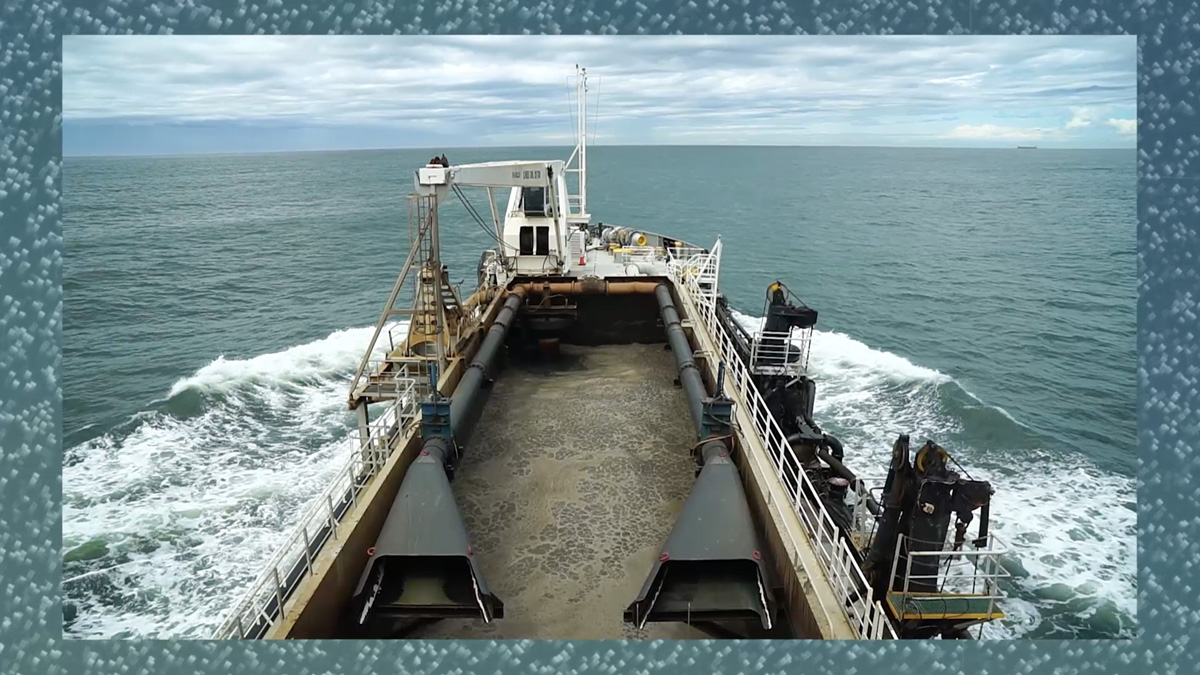Offshore Turbidities:
Mist the Boat

In Offshore Turbidities: Mist the Boat Harun Morrison and Therese Keogh draw on curator and writer Bridget Crone’s (1973–2023) postulation of the ‘turbid image’ to continue to unravel a conversation around sites of environmental and social offshore-ness, and the infrastructures and administrations that maintain the ‘offshore’ of the state through the governance of shorelines. Drawing on examples from their own practices, as well as case studies from recent global events, Harun and Therese will test-run turbidity as a frame through which to understand offshore sites, offering possibilities for imaging offshore relations through their particular turbidities. Throughout this session, Bridget’s theorising of turbidity will guide pathways through the contingent buoyancies, coastal pollutions, weaponised distances, and distributed friendships of the offshore.
Guests
Therese Keogh is an artist and writer born on Gunditjmara Country, Australia. Therese’s practice operates at intersections between sculpture, geography, and landscape architecture, to produce multilayered projects exploring the socio-political and material conditions of narrative and knowledge production. Therese works collaboratively through writing and research projects, including facilitating ‘Magnetic Topographies’ with Clare Britton and Kenzee Patterson—looking to collective pedagogies of place—and ‘Written Together’—a shared workshop for non-normative writing in arts research. Therese is invested in collective imaginaries as a process of creating more just relations to lands and waters and is currently undertaking research into ‘The Spoil Grounds’, an offshore dumping ground of dredged material from the Port of Newcastle, on Awabakal and Worimi Country, on the east coast of the Australian continent. Therese holds a BFA from Monash University, an MFA from Sydney College of the Arts, and an MA Geography from Queen Mary University of London. Therese is currently undertaking a PhD at Victorian College of the Arts, University of Melbourne. https://www.theresekeogh.com/
Harun Morrison is an artist and writer whose work often employs collaborative processes. His practice spans spatial design, text, video and sound. He is currently an associate artist with Greenpeace UK and Designer and Researcher in Residence at V&A Dundee, Scotland. His forthcoming novel, The Escape Artist will be published by Book Works in 2024.
Since 2006, Harun has collaborated with Helen Walker as part of the collective practice They Are Here. Harun has recently contributed to the group exhibition Chronic Hunger, Chronic Desire in Timișoara, Romania, as part of the European Capital of Culture 2023 programme. Solo exhibitions in the last few years include, Dolphin Head Mountain at the Horniman Museum, London (2022 -23), Mark The Spark at Nieuwe Vide project space in Haarlem, Netherlands (2022) and Experiments with Everyday Objects, Eastside Projects, Birmingham, (2021). Harun continues to develop and repair a garden for Mind Sheffield, a mental health support service, as part of the Arts Catalyst research project, Emergent Ecologies, and is producing an evolving publication, Environmental Justice Questions commissioned by Mossutställningar, which he continues to circulate. @harunishere | harunmorrison.net
For preparation
- Bridget Crone, “Turbid Images and Bodies in the Field”, in Fieldwork for Future Ecologies: Radical Practice for Art and Art-based Research (Onomatopee: 2022).
(PDF available upon request. Send a quick note to Moritz Greiner-Petter if you plan to join the colloquium.)
Readings & Materials
- Earth :: a global map of wind, weather, and ocean conditions
- Harun Morrison, Hydrological Cycle playlist, 2021
- Manus Recording Project Collective, 2020
- Deborah Bird Rose, “Shimmer: When All You Love Is Being Trashed”, in Arts of Living on a Damaged Planet (University of Minnesota Press: 2017).
- Therese Keogh, “A misdescribed amendment”, in Runway: Time, 2021
- Harun Morrison, “Temporal Collage and Producing Escape: What is the relationship of modernization to boat living?”, in internationale online, 2020
- Therese Keogh, “To: The Underside of Ships and Maps”, for ½ to dust, 2021
- Kamau Brathwaite, “Bermudas”, 2005
- Ellen van Neerven, “A ship-shaped hole in the forest”, in Throat, (UQP: 2020)
- Surfers Against Sewage, Water Quality Report 2022